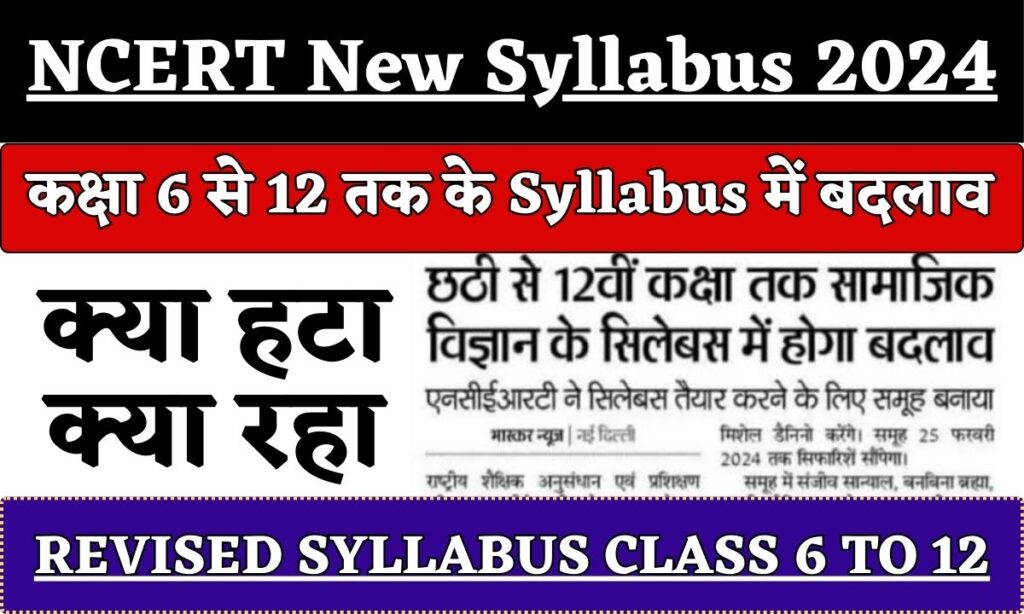NCERT New Syllabus 2024: India’s National Council of Educational Research and Training (NCERT) has initiated a significant change in school education. Chaired by Michel Danino, a 35-member committee has been set up under the National Curriculum and Teaching Learning Materials Committee (NSTC). This committee is dedicated to redesigning the social science curriculum for classes 6 to 12.
Objective Of Committee and Notable Members
The committee includes Sanjeev Sanyal, Banabina Brahma, MD Srinivas, and other influential members from various academic and research-applied fields. The plan aligns with the National Curriculum Framework (NCF) to undertake the task of developing curriculum and instructional materials for History, Geography, Political Science, Sociology, and Psychology.
This step focuses on national educational policy (NEP)
The important initiative aims to align the school curriculum with the National Education Policy (NEP) of 2020. Through promoting classroom-to-classroom connectivity, interdisciplinary connections, and cross-cutting themes in the social sciences, the committee aims to produce teacher handbooks by February 25, 2024.
Curriculum Advisory Groups (Cags) And Coordination
NSTC expects that at least 11 Curriculum Advisory Groups (CAGs) will be formed for different subject areas. At present, CAGs are active in innovative education and teaching-learning materials, Indian Knowledge System (IKS), and social sciences. Groups collaborate to cover boundary-breaking topics in sustainability, interdisciplinary organizations, and social sciences for grades 3 through 5.
Vertical And Horizontal Approach in Social Sciences
Pointing out the need to give impetus to the social sciences, the NCERT notification states, “Both the CAGs of Social Sciences and Economics will ensure this integration by sharing and discussing the draft content prepared by them with each other.
JEE Mains 2024 Syllabus [New]: List of Removed Topics Physics, Chemistry & Maths
What Is the National Council of Education Research and Training?
The National Council of Educational Research and Training (NCERT) is an autonomous organization established in 1961 by the Government of India to advise the Central and State Governments on policies and programs for quality improvement in school education. The principal objectives of NCERT and its constituent units are: to conduct, encourage, and coordinate research in areas related to school education; To prepare and publish model textbooks, supplementary materials, newsletters, journals and didactic kits, multimedia digital content, etc.
NCERT Organize pre-service and in-service training of teachers; Develops and disseminates innovative teaching techniques and practices; Collaborate and network with state educational departments, universities, NGOs, and other educational institutions; Act as a clarification center for ideas & information on issues related to school education. Apart from the activities of research, development, training, extension, publication & dissemination, NCERT is also a sponsoring agency for bilateral cultural exchange programs with other countries in the field of school education.
National Education Policy
The National Education Policy, 2020 (NEP) envisions a paradigm shift in education – “an education system that is rooted in the Indian soil and directly contributes to the transformation of Bharat, i.e., India, into a supportive and knowledge society by providing high-quality education to all, without inequality, making India a global knowledge powerhouse. Education policy lays special emphasis on the development of the creative potential of every person. Its core principle is that education should develop not only mental abilities – such as ‘core’ abilities in reading and mathematics, and ‘higher’ mental abilities, such as critical thinking and problem-solving – but also social, moral, and Emotional capabilities and ideals should also be developed.
RRB ALP Recruitment 2024: रेलवे में 2 लाख 94 हज़ार पदों पर भर्ती नोटिफिकेशन | Apply for Loco Pilot
India Post GDS Vacancy 2024 Online Form | पद 40000+ | कितने % पर होगा सिलेक्शन | पूरी जानकारी
Vision of National Educational Policy
This National Education Policy envisions an education system that is fundamental to the Indian ethos and directly contributes to transforming India, called India, into an equitable and vibrant knowledge society, providing high-quality education to all. By providing education, and thereby making India a global knowledge power.
Educational structure of new education policy
Critically, this policy exchanges that the current 10+2 structure of schools in education will be revised with a new academic and curricular restructuring, with a 5+3+3+ curriculum covering ages 3-18. 4 will have a new structure, as shown in the iconic diagram.
Experiential Learning of National Education Policy
At all stages, experiential learning will be adopted, including hands-on learning, art-enrichment and play-enrichment learning, story-telling-based pedagogy, etc., as standard learning in each subject, and across various subjects. With an exploration of the relationships between. To reduce the gap in educational attainment, the classroom will shift towards belongingness-based learning and education, towards competency-based learning.
Multilingualism And Emphasis on Mother Tongue
It is believed that young children learn concepts more intelligently and deeply in their home language/mother tongue. Home language is usually the mother tongue or the language spoken by the local community. However, sometimes multilingual families may have a home language that is spoken by other members of a family and this may sometimes be different from the mother tongue or local language. Where possible, up to a minimum of Class 5, but possibly a maximum of Class 8 and onwards, the medium of instruction will predominantly be the home language/mother tongue/local language/regional language. Thereafter, the home/local language will be taught as the lingua franca wherever possible.

